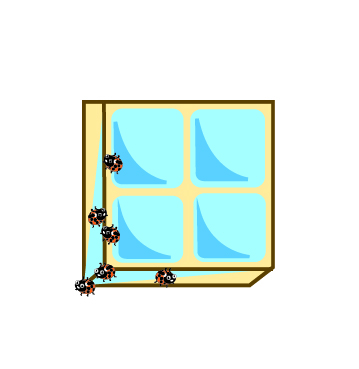
Many of those who have lived in Kirksville during the fall and winter months know by now that the weather is unpredictable. Some days it is sunny and 60 degrees, and other days it is overcast and 15 degrees, with windchill lowering the temperature to two degrees. This year has been especially all over the place with the weather, but along with the warmer days have come orange, small, smelly Asian lady beetles.
Max Sengl, an accounting graduate student at Truman State University, lives in a house in Kirksville and has found himself having to take care of these creatures so they are not constantly swarming his house.
“It’s the weirdest thing,” Sengl said. “I feel like I see them kind of all around campus, but in my room specifically, I probably see about 30 a day, and I probably kill about 10 to 15 a day.”
Fielden-Rachev, a biology professor at Truman, has conducted tick and flee research for several years and did some online research about the Asian lady beetles surrounding the Kirksville community.
Fielden-Rachev said from her research, she concluded that taxonomically, Asian lady beetles are cousins of the red ladybugs we are used to seeing and serve similar purposes.
“Ladybugs are natural predators of aphids [small, sap-sucking insects] and other little things that you find in your garden,” Fielden-Rachev said. “But this one that we’re talking about is actually an introduced species…It originally came from Asia, and it was introduced as a biocontrol agent to control aphids on pecan trees …and then they spread pretty rapidly.”
Fielden-Rachev also said people see these bugs mostly in warmer weather because, like many other insects, they prefer the warmth. That is why people like Sengl see so many in their houses when the weather gets unpredictable — the Asian lady beetles are looking for a warm place to hide.
One common worry is that these beetles are harmful since they bite. Thankfully, Fielden-Rachev put these worries to rest by saying that they are not harmful and if they do bite you, it will most likely go unnoticed. She said the only long-lasting issue with them is that if you squash one, they will release a yellow fluid that could leave a stain.
Sengl said he will wake up with small bites and after remembering he had seen some in his bed previously that day, he figured that is from where the bites most likely came from. He said he was never worried about it because if he finds one, he will simply scoop it up and flush it down the toilet.
While these insects might show up in your house or around Truman’s campus, there is no need to fear them, Fielden-Rachev said. Other than the potential yellow stain from squishing them, there is no permanent damage that will be done to you or anything in your house.
“I don’t think there’s reason to panic…you’re not going to get any diseases,” Fielden-Rachev said. “If they bite you, you’re not going to die, and they’re not going to hurt your pets. They’re not going to eat your stored food. They’re not a household pest. They’ve just been a bit of a nuisance.”
